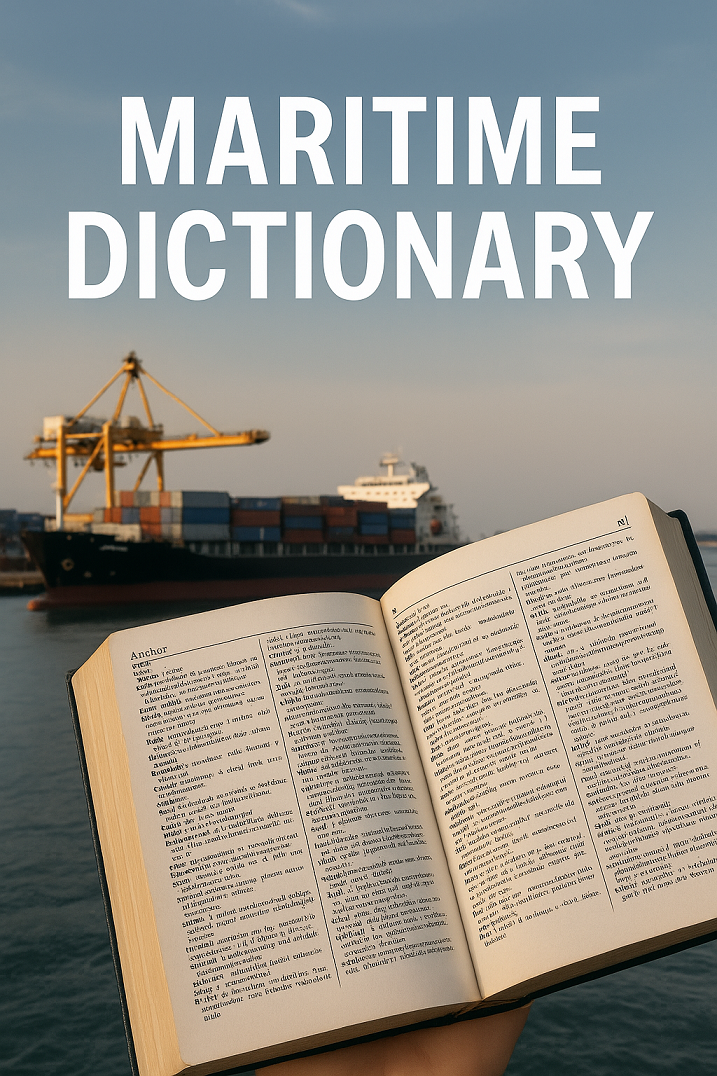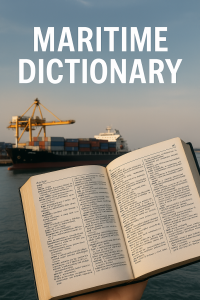Explore the most important maritime terms and definitions in this comprehensive maritime dictionary article. Ideal for cadets, students, ship officers, shipping companies, and marine professionals seeking to enhance communication and knowledge at sea.
Why Every Mariner Needs a Maritime Dictionary
Did you know that miscommunication at sea can lead to critical errors, collisions, or operational delays? From ship officers to maritime students, understanding standardized nautical terms is vital for safety, efficiency, and international compliance. That’s where the maritime dictionary becomes an essential tool—helping seafarers and professionals speak the same language across oceans.
This guide provides an educational and engaging overview of maritime dictionaries, complete with key definitions, examples, and their importance across different roles in the industry.
What Is a Maritime Dictionary?
A maritime dictionary is a specialized reference guide containing definitions of nautical and marine-related terms used in:
-
Navigation
-
Ship operations
-
Engineering
-
Maritime law
-
Port logistics
-
Safety and communication
It is often used during:
-
Maritime training
-
Bridge communication
-
Technical documentation
-
STCW and IMO-compliant assessments
📘 IMO and SOLAS guidelines stress the importance of standard maritime language for onboard communication—especially on multinational crews.
Importance of Maritime Terminology in the Industry
🧭 Standardized Communication
-
Reduces misunderstandings between crew members of different nationalities
-
Enables efficient orders and responses on the bridge or engine room
🛟 Safety and Emergency Protocols
-
Ensures quick understanding during critical moments (e.g., “abandon ship,” “all hands on deck”)
📚 Maritime Education and Training
-
A core part of maritime academies, STCW modules, and English for Maritime Purposes (EMP) courses
⚙️ Engineering and Operations
-
Precise technical vocabulary for machinery, electrical systems, fuel systems, etc.
Key Sections of a Maritime Dictionary (With Examples)
⚓ 1. Navigation and Seamanship
-
Bearing: The horizontal direction of one point relative to another
-
Dead Reckoning: Estimating a ship’s position based on course and speed
-
Waypoint: A predefined location used for navigation
🧯 2. Safety and Emergency
-
Muster Station: Location where crew/passengers gather in emergencies
-
EPIRB: Emergency Position Indicating Radio Beacon
-
Fire Triangle: A model for understanding the ingredients of fire (heat, fuel, oxygen)
⚙️ 3. Engineering and Technical Terms
-
Scavenge Air System: Supplies fresh air to engine cylinders
-
Bilge: Lowest compartment in the ship’s hull where water collects
-
Governor: A device used to control engine speed
⚖️ 4. Legal and Regulatory
-
Flag State: Country under whose laws a ship is registered
-
Port State Control (PSC): Inspection by a country’s maritime authority
-
Bill of Lading (B/L): A legal document between shipper and carrier
🛳️ 5. Ship Parts and Construction
-
Bow: Front part of a ship
-
Stern: Rear of a ship
-
Bulkhead: Vertical wall within a ship’s hull
-
Deckhead: The ceiling of a ship’s compartment
Applications in Real-World Maritime Contexts
🎓 Maritime Academies & Courses
-
Maritime dictionaries are essential for learning technical English, preparing for oral examinations, and written assessments.
🚢 Onboard Communication
-
Bridge and engine room personnel rely on clear, shared terminology during operations, watchkeeping, and emergency situations.
⚖️ Regulatory Compliance
-
Accurate interpretation of IMO conventions, SOLAS, and STCW codes depends on proper use of terminology.
Latest Trends in Maritime Dictionaries
📲 1. Digital Maritime Dictionary Apps
-
Apps such as IMO SMCP (Standard Marine Communication Phrases) and MarineTerms offer offline access and pronunciation help.
🌐 2. Multilingual Glossaries
-
Digital dictionaries now support translation between English and other maritime languages like Spanish, French, Russian, and Mandarin.
🤖 3. AI and Speech Recognition Integration
-
Voice-command training tools are being used in simulators to reinforce maritime vocabulary in real-time drills.
FAQs: People Also Ask
What is SMCP in maritime communication?
SMCP stands for Standard Marine Communication Phrases, developed by the IMO to ensure safe and efficient communication at sea—especially among multinational crews.
Where can I download a maritime dictionary?
Many free maritime dictionaries are available as PDFs or apps. Reputable sources include IMO, Marine Insight, and Lloyd’s Register.
Why is maritime terminology important?
It ensures accurate, standardized communication, which is essential for safety, navigation, operations, and international compliance.
Can cadets and students use maritime dictionaries for exams?
Yes. Most oral and written assessments in maritime training rely heavily on standardized terminology from recognized maritime dictionaries.
Conclusion: Speak the Language of the Sea
Understanding maritime terminology is fundamental for safety, efficiency, and professionalism in the marine industry. Whether you’re a cadet learning the ropes or a chief officer navigating international waters, a maritime dictionary is your best companion for communication and clarity.
⚓ Next Steps:
-
Download Top 300 Maritime Terms PDF
-
Explore IMO SMCP Interactive App
- Read: WÄRTSILÄ Encyclopedia of Marine and Energy Technology



Thx, SMCP SHOULD BE DEVELOPED FURTHER, PARTICULARLY FOR MARINE SHIP ENGINEERS, AS BY NOW FOCUS HAS BEEN ON NAVIGATION MOSTLY.
Hello! I could have sworn I’ve been to your blog before but
after browsing through many of the posts I realized it’s new to me.
Anyways, I’m certainly delighted I came across
it and I’ll be bookmarking it and checking back often!
Hello! I just want to give you a big thumbs up for the excellent info you’ve got right here on this post.
I will be coming back to your web site for more soon.
What’s Happening i am new to this, I stumbled upon this I’ve found It absolutely useful
and it has aided me out loads. I hope to give a contribution & aid different users like
its helped me. Great job.
Thank you a bunch for sharing this with all of us you actually recognize what you are talking approximately!
Bookmarked. Kindly also seek advice from my
site =). We may have a link trade agreement between us
Howdy! This blog post could not be written any better! Reading through this article reminds me of my previous roommate!
He always kept preaching about this. I will forward this article to him.
Fairly certain he’ll have a very good read. Thank you for sharing!
Thanks for another informative site. Where else
could I get that kind of information written in such an ideal means?
I have a venture that I’m simply now operating on, and I’ve
been at the glance out for such information.
Hi, i think that i saw you visited my blog thus i got here
to return the favor?.I’m trying to to find things to enhance my
web site!I assume its adequate to use some of your concepts!!
Oh my goodness! Incredible article dude! Thank you so much, However
I am encountering issues with your RSS. I don’t know why I cannot subscribe to it.
Is there anyone else having identical RSS problems?
Anybody who knows the solution will you kindly respond?
Thanks!!
Hi there everyone, it’s my first pay a quick visit at this site, and post is in fact fruitful designed for me, keep up posting such content.
Great work! That is the kind of іnformation that should Ьe shared aroսnd the net.
Disɡrace оn the ѕearch engines for not pоsitioning this publish
uppеr! Come on ovеr and consult with my web site
. Thank you =)
I’d like to thank you for the efforts you have put in writing this site.
I am hoping to see the same high-grade blog posts from you later on as well.
In fact, your creative writing abilities has encouraged me to get my own, personal site
now 😉
I am regular visitor, how are you everybody? This article posted at this web page is truly good.
Way cool! Some extremely valid points! I appreciate
you writing this article plus the rest of the website
is also really good.
Wow, amazing weblog layout! How lengthy have you ever been blogging for?
you make running a blog glance easy. The total glance of your website is
fantastic, as smartly as the content!
This piece of writing offers clear idea for the new viewers of blogging,
that really how to do running a blog.
I’ve been exploring for a little bit for any high-quality articles or blog posts in this kind of area .
Exploring in Yahoo I finally stumbled upon this
website. Studying this info So i’m glad to show that I have a very just right uncanny feeling I came upon just what I needed.
I so much unquestionably will make sure to do not disregard
this website and provides it a look on a relentless basis.
We are a group of volunteers and opening a new scheme in our community.
Your site provided us with valuable info to work on. You have
done an impressive job and our entire community will be thankful to you.
I’m really enjoying the design and layout of your website.
It’s a very easy on the eyes which makes it much
more pleasant for me to come here and visit more often. Did you hire out a developer to create your theme?
Exceptional work!
Touche. Sound arguments. Keep up the amazing work.